Itís Sunday afternoon at the Peninsula
Hotel on Fifth Avenue in New York, and actress Rosamund Pike has come
down with a terrible cold. She has also developed a case of laryngitis,
her voice a hoarse croak, while on the road for a publicity tour for her
film A United Kingdom. Still, trouper that she is, she takes a
cup of tea and sits down to discuss the film with a procession of
journalists.
It is a labor of love; both her acting career and more specifically
this new film. Pike had gotten involved in the movie when actor David
Oyelowo, with whom Pike had worked with previously in Jack Reacher,
had emailed her saying he was sending a script that was arguably the
best love story in history. That script was A United Kingdom.
Telling the story of Saretse Khama, the incoming King of the
African country of Bechuanaland (which has since become Botswana) and
Ruth Williams, a British office worker. Seretse and Ruth met at a party
and fell in love at first sight. Though they had little in common Ė he
was African royalty, she was a white commoner Ė there was an instant
attraction. They were quickly married and Ruth moved to Africa with
Saretse, despite the disapproval of her family, his family, his country
and the world of 1947 in general. Their relationship was used as a
political chip in the United Kingdomís attempt to annex his country, but
the two worked together to save the country and make it a free
democracy.
Itís another fascinating role in the always intriguing British
actressí widely varied body of work. Pike is probably best known for her
Oscar nominated turn as the unhappy and slightly unhinged title
character housewife in the hit thriller Gone Girl. She has also
worked on a complicated filmography that includes being a Bond girl in
Die Another Day, playing the sane girl amongst
arrested-development guys in the sci-fi comedy The Worldís End, a
feminist civil rights pioneer in Made in Dagenham, the
long-suffering girlfriend of a man in the midst of a mid-life crisis in
Hector and the Search for Happiness and a mythical Goddess in
Wrath of the Titans.
Shortly before the New York and Los Angeles premieres of A
United Kingdom, Pike braved her illness to sit down with me for this
exclusive chat.
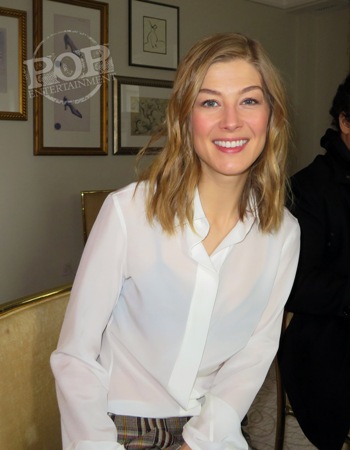 You were
saying that David contacted you to tell you about Ruthís story with
Khama. What was it about the story that really fascinated you? How did
it make you know that you wanted to do this movie?
You were
saying that David contacted you to tell you about Ruthís story with
Khama. What was it about the story that really fascinated you? How did
it make you know that you wanted to do this movie?
It was this phenomenal love story that sends
this blinding message of hope into the world. Political change is broken
by love, as far as I could tell. I just found it sensational. I thought
no oneís going to leave this theater after watching this movie without
feeling filled with hope and I love that. Ruth and
Seretse were such pioneers. Ruth was this
courageous woman in loving so committedly and wholeheartedly. I just
thought this is fantastic. This is everything we need now. Itís the fact
that, yes itís political, but its politics come by completely honestly.
You know they want to be together and stay together. In striving for
that they achieve so much more.
Ruth
certainly took a huge chance for love. She basically alienated her
family, flew to a different country that she didnít know, all for a man
that she barely knew. Do you think that you could be that brave in the
face of love and do something like that?
The point is when youíre in it, youíre not
thinking about it. Youíre not thinking about changing the world. Youíre
just trying to focus. Youíre focusing on something very immediate. She
was certain. She had certainty about Seretse. Precious few people find
that certainty, so yes I believe that if I was motivated by the same
love, I would do it the same. I would play it in the same way.
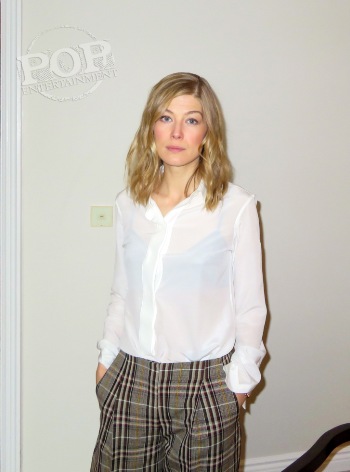 David was
so magnetic and amazing, as he was Dr. Martin Luther King in
Selma.
I know that youíve worked with him before, but what was it like to work
against him in this type of a role?
David was
so magnetic and amazing, as he was Dr. Martin Luther King in
Selma.
I know that youíve worked with him before, but what was it like to work
against him in this type of a role?
It was heaven. I knew I liked him and I knew we
got on well, but I had no idea that we would find the kind of chemistry
we did just instinctively, naturally and immediately. It was heaven. I
think it was probably because we were both equally committed to these
roles. We both felt passionately that we wanted to bring this to the
screen. We were buoyed up and inspired by Seretseís love. Somehow that
was channeled through us. It was easy from day one. It was easy.
Did he
ever tell you why they thought that youíd be the ideal Ruth?
No, but Iím so glad he did. Clearly he felt bad
about tasering me when I was pregnant in the lift in Jack Reacher
and he needed
to make it up to me.
That
might be it, yes. Do you look at it as more of a love story or political
story? It can be looked at in both ways.
I look at it first and foremost as a love
story. As I said, itís this political change brokered by love. Itís the
love story that drew me to it. Itís the fact that Ruth had to discover
politics as the story went on that intrigued me.
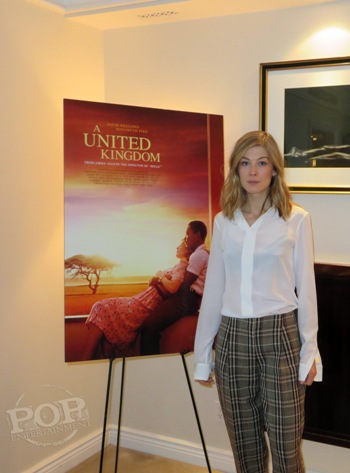 It was
interesting to me it almost seemed like Ruth, while she certainly
stepped up to what she did, she seemed like she mightíve been just
happier to have a quiet life with her husband and her child and not to
be thrust into this type of thing. Do you think she just felt like she
had to step up to help her husband and the people?
It was
interesting to me it almost seemed like Ruth, while she certainly
stepped up to what she did, she seemed like she mightíve been just
happier to have a quiet life with her husband and her child and not to
be thrust into this type of thing. Do you think she just felt like she
had to step up to help her husband and the people?
I think she took her responsibilities in
Botswana very seriously. They realized that they were involved in this
political game. It was much bigger than them. They were being moved
around like chess pieces. You canít help but feel the need to fight this
injustice. They were pawns in somebody elseís game. They really were,
even to the point that Winston Churchill, when he was facing reelection
used them to garner support and then left them in the lurch once he was
in the government.
Itís
funny because when people think of Winston Churchill they think of the
good things he did in World War II, but they forget about this type of
stuff. Was it important to you to get this part out too?
I just didnít know that part of the story. When
I read the part of the script where Churchill was endorsing the idea of
marriage and saying that this king must be returned to his queen, I
thought: oh, itís Churchill; heís going to make it all right. Heís going
to win the election. I felt a sense of security. Often Churchill does
represent security in fiction. Then I was horrified at the betrayal.
What was
it like filming in Botswana?
It was amazing. It was a gift for all of us, in
terms of getting the sense of place. You couldnít mock it up anywhere
else. We had the supporting actors, all of the community who were
involved in the film, playing the men in the kgotla [public
meeting] and the village people. The women who built the rondavels Ė
the round houses. There were moments like that moment where all the
women sing to Ruth, which was an unscripted, unasked for moment. It was
just a spontaneous gift of song that arose in the moment. You wouldnít
have gotten that if you [made it elsewhere]. Thatís a culture bringing
its roots to bear on a movie. If weíd filmed it somewhere else, we
wouldnít have had that.
The story
is over 60 years old, but itís sadly still very relevant now. What do
you think people today, in this crazy political climate, can take from
this story?
I think they can take a message about trust. We
are being invited every day to mistrust everybody. Close down our
borders. Close down barriers to understanding and acceptance. This is a
film thatís about the exact opposite. Itís inviting you to trust. Itís
inviting you to look at what can be achieved if you trust. The alliances
that can be made and the bridges that can be built.
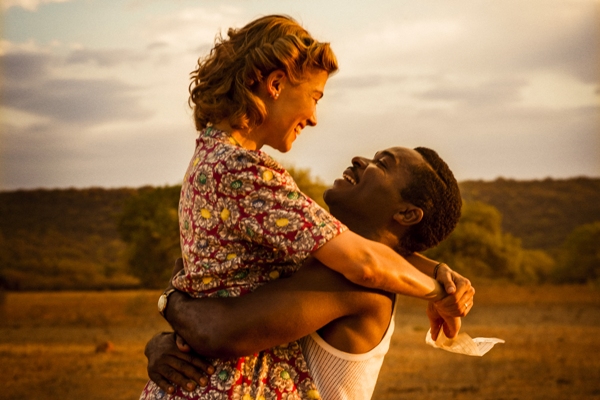 Do you
think that if she were alive today, Ruth would be involved with the
womenís marches all around the world?
Do you
think that if she were alive today, Ruth would be involved with the
womenís marches all around the world?
Oh, 100% she would. Yeah. She definitely would.
When
youíre playing real people... obviously Ruth is not as well known as
some others, particularly in the US... but how responsible do you feel
to getting the reality of their being out there? Itís different than
playing a fictional character.
It is, although people can have much more
ownership over a fictional character sometimes in their minds. You can
get a lot more wrong for people sometimes trying to inhabit a fictional
character. In a way it was a dream, this, because they are real, so we
have source material to draw on. Yet nobody really knows about it, so
itís not like playing Churchill, or David playing Seretse. People are
getting to know the story very likely through our film, so we have some
license. Obviously, as actors you want to get close to the truth. You
want to feel that you are inhabiting something in an honest way. But the
fact that I didnít look exactly like Ruth doesnít matter.
You got
to meet the son, who is now the president of Botswana. Also you got to
meet other members of the family. Were you able to talk with them about
Ruth and find out different things?
We were, but of course weíre dealing with the
sons and they have a very different understanding of their parents. They
were always their parents. When you think about your own parents, youíre
not necessarily au fait
with all the details of their courtship. Maybe you are, but you donít
know exactly who they were when they were in their twenties.
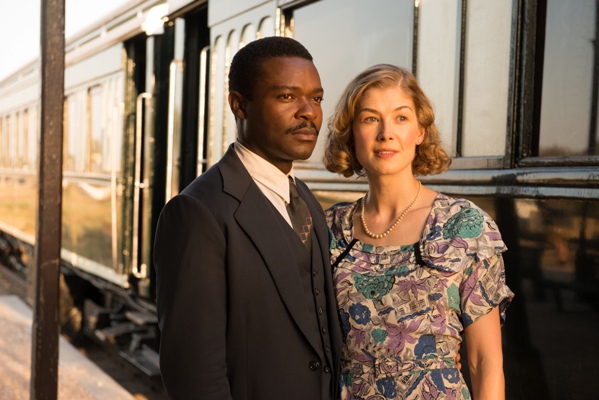 David
said to me, which I thought was really cool, the reason that he thought
that you would be perfect for the role is because so many actresses, he
could picture how theyíd play the part. He couldnít picture how you
would, but he knew that it would be good. How did you come about your
ideal of Ruth?
David
said to me, which I thought was really cool, the reason that he thought
that you would be perfect for the role is because so many actresses, he
could picture how theyíd play the part. He couldnít picture how you
would, but he knew that it would be good. How did you come about your
ideal of Ruth?
By just being open. By feeling like she had
this restless spirit. After her experiences in the war, she was looking
for something. She didnít know what. It was the restlessness and the
finding of a home for that restlessness in him. And then, my performance
is all about David, really if Iím truthful. I didnít create it in
isolation. I created it looking at him.
In what
ways do you feel you are like Ruth, and what things as an actress did
you have more trouble coming to terms with playing?
I didnít have trouble coming to terms with any
part of her. I have some of her free spirit, but I think I have a lot
more fear in me than her. Itís liberating to play a character who can
allow you to escape some of your negative characteristics. Itís
liberating.
Ruth had
to juggle being a political figure and also being a mother. Youíre a
mother as well, and you also have a very demanding job. How do you
juggle your career and motherhood?
Itís hard. I mean, itís been easy so far
because my family traveled with me. Weíve had amazing adventures in
Botswana making this movie. In Santa Fe for three months last summer. In
Morocco and Malta just now. In LA making Gone Girl. Weíve been a
kind of rock and roll band going around the world and itís been
fantastic. Now I have to get my priorities straight. I have to
prioritize my children, but know that they will be proud to have a
mother who is pursuing her dream career. I have to just balance it. I
have to find the balance. Itís new. Itís all new. Itís all changed now
my sonís going to school.
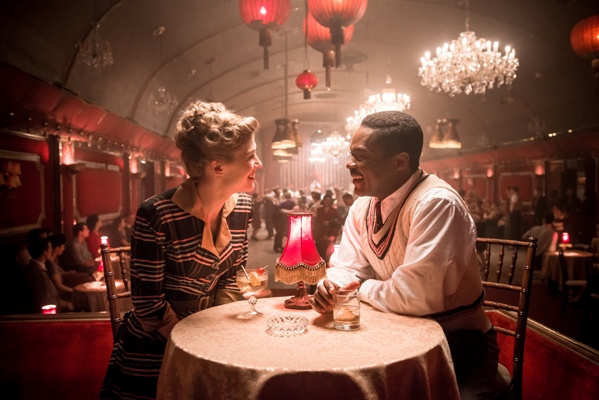 You just
mentioned
Gone
Girl. Do you find that men look at you a little differently than they
did before since playing that role?
You just
mentioned
Gone
Girl. Do you find that men look at you a little differently than they
did before since playing that role?
Yeah, maybe. Even just going to a restaurant
last night people were like, "Oh my goodness, you terrified me."
What is
it like that perhaps the character that youíre best known for was a
really crazy person?
Oh, I love that. I think thatís great. I like
it. I like letting out the crazy.
One thing
Iíve always found fascinating about your career is that you do so many
different types of things. Youíll do comedies like
The Worldís End, or dramas like this, or
big-budget blockbusters like Gone Girl or smaller films like
Made in DagenhamÖ
Gone Girlís
a holy grail. Itís an adult movie that is a huge box office hit. Thatís
the goal. You want a film that grown ups want to go and see in the
theater.
The
Oscars are coming up. What was it like when you found out that you were
nominated for an Oscar for
Gone Girl
a few years ago?
It was unbelievable, because Iíd done nothing
to pitch for it. You always hear that the Oscars require a great big
campaign. I was pregnant and had a newborn baby and I did nothing. So
that was testament to the fact that [you donít need to schmooze].
It made me feel very hopeful. I thought, well okay, itís not all about
cynical political appealing for votes, because I got votes and I hadnít
tried for them. That was very exciting. It was an amazing feeling.
Youíre always an Oscar nominee arenít you, forevermore?
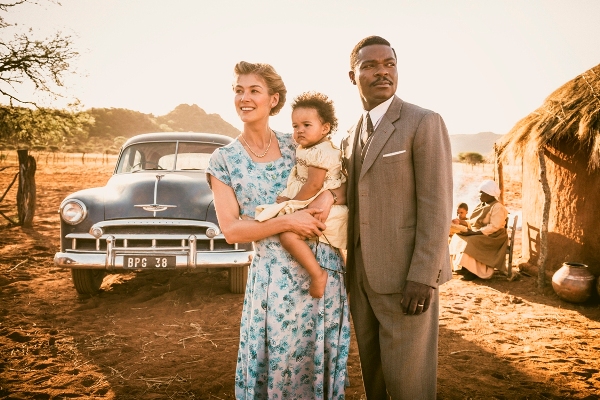 A few
years ago I interviewed Simon Pegg and Nick Frost about
The Worldís End. They said that you
were great fun to have on the set; you were like another one of the
guys. It just seems like that wouldíve been a fun movie to be in. What
was the shoot like?
A few
years ago I interviewed Simon Pegg and Nick Frost about
The Worldís End. They said that you
were great fun to have on the set; you were like another one of the
guys. It just seems like that wouldíve been a fun movie to be in. What
was the shoot like?
Oh, it was great fun, hilarious. Those guys,
itís like hanging out with all the cool kids the whole time. Theyíre
always funny. Theyíre funny guys all the time. Quiz shows, game playing.
Thereís nothing serious on set. Itís fantastic.
Youíd
done more than your share of period pieces as well like this one
obviously and things like
Barneyís
Version and Made in Dagenham...
Recently, Iíve done all period pieces this
year.
Yeah,
exactly. What is it like to sort of immerse yourself in another time?
Itís like learning about history; itís a
wonderful history lesson. Itís learning about yourself. I think the more
I grow up, the more I realize that history is an amazing way to
understand ourselves. This year Iíve spent in 1982, 1892 and 1976....
You have
a few movies coming out. I know that youíve got
Hostiles coming out and High Wire Act.
What can we expect from those?
High Wire Act
is a very interesting look at the beginnings of the strife in the Middle
East. [Itís] set in Beirut in 1982, just probably before the bombing of
the American embassy. Itís a thriller, a fictional thriller, but based
on a certain hostage crisis that happened during that time. I just
wanted to look at the Middle East through the prism of the 1980s. It was
a very interesting melting pot at that time. And then Hostiles is
a real journey across the American west. Again, a story that hopefully
will bring people together. A story about strife and fear. [About]
having the need for an enemy and the need to overcome that and
forgiveness. Itís a very, very human story.
CLICK HERE TO SEE
WHAT ROSAMUND PIKE HAD TO SAY TO US IN 2011!
Email us Let us know what you think.